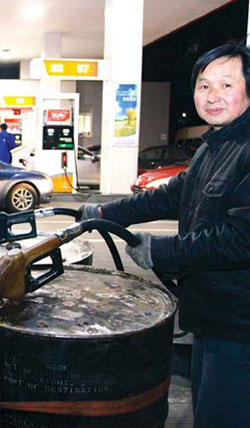Rising pump prices add fuel to vehicle market downturn
Updated: 2012-03-26 13:40
By Han Tianyang (China Daily)
|
|||||||||||
In addition to a slowing economy, the latest fuel price hike will add more downward pressure on the car market this year, according to industry analysts.
 |
|
A trucker stocking up on fuel on March 19, before the latest price increase took effect.?[Photo/China Daily] |
It was the biggest increase in government-controlled fuel pricing since June 2009 and boosted average retail prices for gasoline and diesel to record highs of more than 8 yuan per liter.
Six weeks ago, the NDRC raised fuel prices by 300 yuan per ton.
"Two price increases in two months is a significant raise," said Zeng Zhiling, director of LMC Automotive Asia Pacific Forecasting.
"It will certainly have negative impact on the car market, especially on the small, low-end vehicle segment where buyers are more sensitive to price changes," he said.
But demand for high-end and luxury cars won't be as affected, he added.
Zhang Yu, director of industry consultancy Automotive Foresight (Shanghai) Co Ltd, agreed that the price rise will hit consumer confidence, especially for those who buy small, economic vehicles made by domestic carmakers.
"The market share for domestic brands might continue to slide this year," Zhang said.
Due to a late start in manufacturing and lack of advanced technologies, Chinese carmakers mainly produce small cars with low profit margins.
They sold about a third of the cars purchased in China last year, with foreign-branded vehicles made at Sino-foreign joint ventures comprising the majority of the market.
As sales stalled last year following explosive growth in 2009 and 2010, homegrown brands were the most impacted and saw their market share squeezed further.
In the first two months of this year, sales of domestic-brand cars dropped 16.9 percent over a year earlier as the overall market declined by 6 percent, according to China Association of Automobile Manufacturers.
As a result, the market share for indigenous brands fell by more than 1 percentage point since the new year began.
Gu Xianghua, deputy secretary general of CAAM, said total vehicle deliveries in China this year might not increase by even 5 percent in the difficult economic environment, according to a Bloomberg report last week.
"The slowing economy will make it difficult to secure loans for commercial vehicles, while restrictions on car ownership in Beijing and vehicle operating costs for fuel and parking fees are increasing," the report quoted Gu as saying.
"All these factors will have an impact on car buying in China."
hantianyang@chinadaily.com.cn








